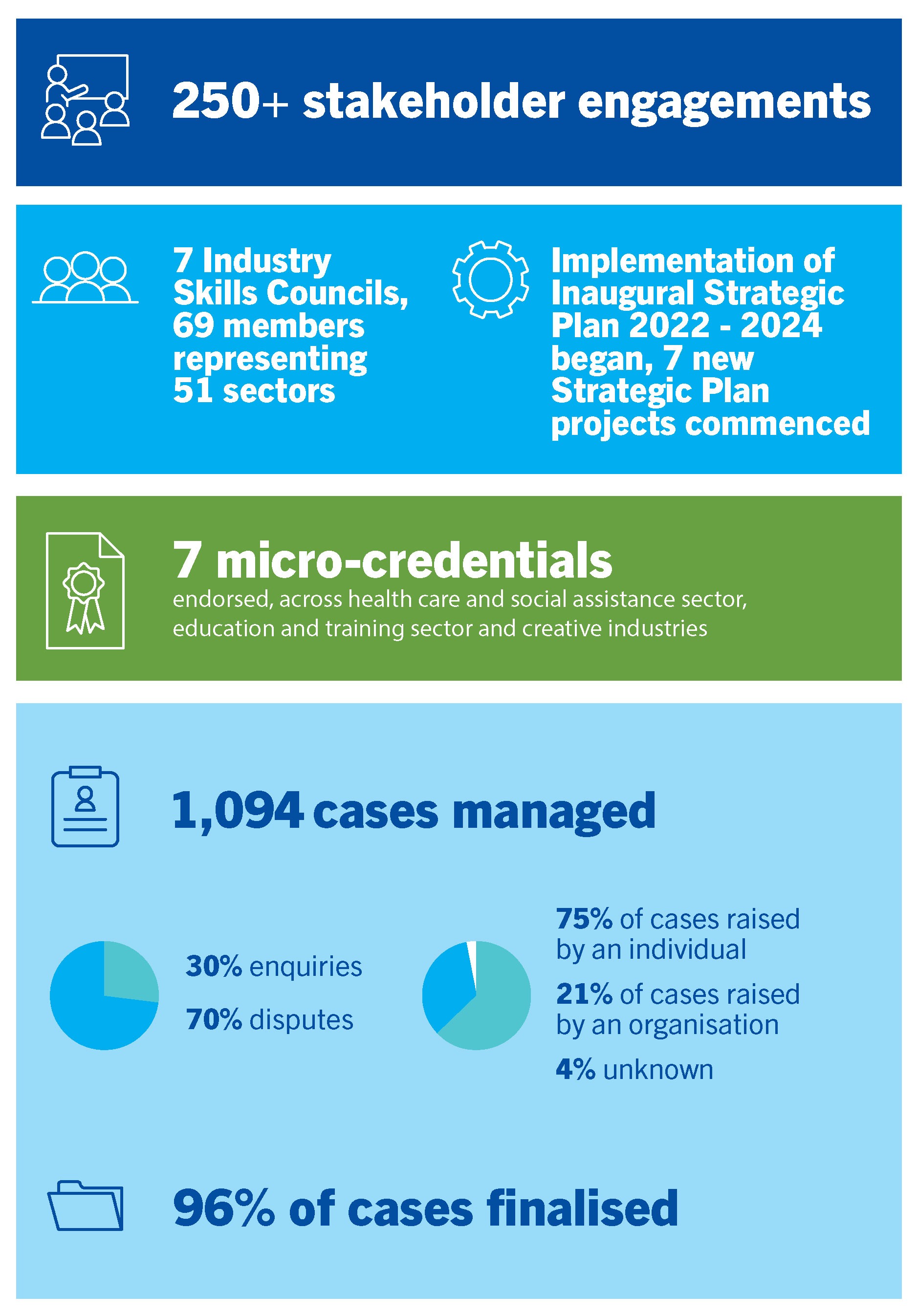The South Australian Skills Commission’s second year of operations has been as equally productive as its first. Guided by its inaugural Strategic Plan 2022-2024, the Commission embarked on several key projects focussed on its core functions under the South Australian Skills Act 2008.
The establishment of Jobs and Skills Australia and the announcement of the ten Jobs and Skills Councils in late 2022, signalled the need for greater collaboration with like bodies in other states and territories. To that end, a new body, the Federated Industry Skills Network (FISN) had its first meeting in Adelaide, coinciding with the Australian Training Awards hosted in South Australia on Friday 18 November 2022.
Membership of, and contribution to, the FISN supports the Commission’s function of advising the Minister on the State’s role as part of an integrated national system of education and training. Fostering national coordination of industry advice and bringing a shared approach to training package review and development, the FISN seeks to assist in mitigating stakeholder engagement overload.
In providing advice to the Minister and national authorities, the Commission is supported by its seven Industry Skills Councils (ISCs). Members of ISCs are selected for their individual skills, technical knowledge of vocational education and training (VET) and breadth of understanding of specific industries that underpin the South Australian economy. Supporting the work being undertaken at the national level including consultation on:
- Australian Bureau of Statistics’ review of occupation codes
- Jobs and Skills Australia’s Skills Priority List
- Department of Employment and Workplace Relations Australian Apprenticeship Priority List.
In addition to assisting the development of the Commission’s projects to support its Strategic Plan, ISCs have provided input to key state priorities including:
- Skills SA Department for Education 10-year Skills Plan
- Department for Education conversation on the purpose of public education in South Australia
- Department for Education’s technical colleges.
As a contributor to the development of the Roadmap for the future of TAFE SA (2023-2033), the Commission was keen to convey the benefits to be realised by greater collaboration between TAFE SA and other training organisations. The Commission further cautioned against a wholly market-based approach to the VET system in South Australia.
The role of Skills SA and its delegates who manage much of the day-to-day operations associated with the administration of apprenticeships and traineeships is acknowledged. Throughout 2022-23 the Commission continued its focus on building reliable and timely reporting and monitoring on traineeships and apprenticeships. Complementary to this work is the Commission’s dispute resolution and mediation service, supporting apprentices, trainees, employers, and students.
In early 2023, the Commission welcomed the establishment of a national VET Completions Taskforce by the Minister for Education, Training and Skills. To support this work, the Commission and Skills SA partnered to deliver the VET Completions Interactive Workshop in May 2023. The workshop enabled the collation of shared experiences of registered training providers, employers, unions, apprentices, trainees and students, to inform the National Skills Agreement.
The South Australian Training Awards once again provided the opportunity to acknowledge and commend our State’s finest training providers, VET students, apprentices and trainees and their employers, and their role in fostering excellence in skills and workforce development.
The joint Commission and Skills SA Department for Education Micro-credentials Pilot program concluded on 30 June 2023. From its commencement in November 2020 to 30 June 2023, 34 micro-credentials have been endorsed, 278 participants (as at 31 March 2023) having completed a micro-credential. An evaluation of the pilot will inform decisions about future micro-credential frameworks.
Tribute is paid to the outgoing members of the board, Dino Rossi, Caroline Rhodes, Steve Shearer, Andrew Clarke, Tanya Cole, Paul Brock, Richard Finlayson, and Liz Cohen, who retired in December 2022, for the untiring and collaborative application of their professional expertise and knowledge in support of the Skills Commissioner and the Minister. Each board member brought valuable skills and expertise and a commitment to strategic and systematic improvements to the South Australian VET system and positioning it within the national context.
It was an honour and privilege to take the role of acting South Australian Skills Commissioner following the unexpected resignation of Renee Hindmarsh, the inaugural South Australian Skills Commissioner. Renee was indefatigable in her approach to systems change and improvement to support students, business and industry more broadly. Her oversight of the establishment of the Commission and deepening connections within and across government and industry is applauded.
Sara Longbottom
Acting South Australian Skills Commissioner (3 April – 21 July 2023)
South Australian Skills Commission
